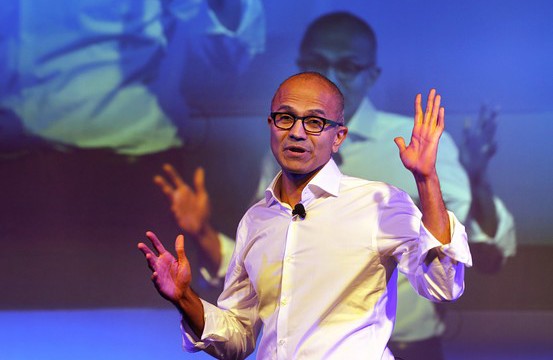Reposted from The Wall Street Journal.
In the span of a week he has done more to put the issue of pay inequality under the national spotlight than anyone in recent memory. The long-term financial implications of this inequality are startling–particularly when you factor in women’s propensity to spend an average of 11 more years than men out of the paid workforce caring for children and/or elderly parents.
As a refresher, on Oct. 9 Nadella suggested at a tech conference that women who
don’t ask for pay raises would be rewarded with “good karma” (and apologized soon after in the face of internet outrage). On Oct. 15, Nadella released a companywide memo reiterating his apology, outlining plans for increased diversity and inclusion throughout Microsoft, and pledging commitment to both equal pay for equal work and equal access to equal work.
To understand the financial magnitude of this issue, let’s compare the financial experiences of hypothetical tech employees Joe and Jane who do equal work. Joe earns $50,000 a year. Jane earns 77% of what Joe does or $38,500. Joe earns more than Jane because he negotiated his first salary out of graduate school and Jane did not. (Note: some analyses suggest women’s earnings have risen from $0.77 to $0.78, and other calculation methodologies suggest it is closer to $0.80. No matter which of these numbers you use, women still earn less than men for equal work).
Both Joe and Jane save 10% of their starting salary annually for retirement beginning at age 25 (i.e. Joe saves $5,000 a year and Jane saves $3,850). Both earn an average annual net return on their investments of 6%. Both retire at age 70. To keep it simple, let’s assume no pay raises. The only other difference between the two is that Jane–like the average working woman–spends 11 fewer years in the paid workforce caring for children and/or elderly parents. This difference is vital, as it makes the pay gap even more punishing. (In my calculations, I assume Jane is out of the workforce from age 35-46).
Fast forward to retirement. In nominal dollars, Joe has $1,063,717 in retirement savings. In stark contrast, Jane has barely half–just $585,678.
I call this dramatic reduction in long-term savings “The 77/11 Effect.” That’s the impact of earning $0.77 on the male $1.00 over 11 fewer years in the paid workforce. Oh, and don’t forget that Jane’s savings will need to stretch further than Joe’s given her longer life expectancy.
Now let’s consider the broader societal context by extrapolating the experience of our avatar Jane across big company demographics. Take a company of Microsoft’s size, for example, with its 128,000 global employees–of which roughly 28% are women. Assuming 80% are based in the U.S. that gives us 28,700 females drawing paychecks domestically. For argument’s sake, let’s also assume that each woman at this large hypothetical corporation follows the exact career path as our avatar Jane. That means each woman would also have $478,039 less in post-career retirement savings than the comparable male avatar, Joe.
Collectively, these 28,700 women would have $13.7 billion less in their nest eggs than their male counterparts.
My intention with this example is to illustrate at scale–to corporate CEOs and leaders across the country–that this issue of pay equality is far from trivial and has widespread implications.
With women representing an increasing portion of household breadwinners and co-breadwinners pay equality is not just a woman’s problem. It’s ultimately everyone’s problem. Does anyone truly want their mother, daughter, sister, wife, niece, aunt, and female friends to end up facing severe financial headwinds because they were afraid to speak up in the workplace and ask to be paid fairly?
Importantly, Nadella’s original candid comment provided a tangible, powerful data point about a subject long lurking in the workplace shadows: When women call forth the courage to ask for a raise–which we don’t do nearly as often as men–we often stir up a hornet’s nest of reactions. Ultimately, everyone gets stung.
For here is the inconvenient truth: Men can ask for a raise using a wide range of styles. If women, by contrast, use the “wrong” tone, body language, or phrasing the request can quickly backfire. As research by Harvard University’s Hannah Riley Bowles and Carnegie Mellon’s Linda Babcock shows, women who ask for raises or mention competing job offers in negotiations may achieve financial success but this often comes at the price of lasting social duress. You may get the money but as Nadella originally alluded, beware of the potential “bad karma”!
As a son, husband, a father, and an employer of many women, Nadella is in a unique position to use what he calls “a humbling and learning experience” as inspiration to reinvent Microsoft and corporate America as investors in women. As a visionary, Nadella can commit himself to building out the most female friendly workplace in history, showing the world the benefits of harnessing the intellectual power that comes from maximizing the talents of 51% of the population.
The time has come for thriving corporate entities to exist in which both women and men have equal opportunities to contribute and be compensated for equal work. Now there’s an end goal, which will surely result in “good karma”–for all.


